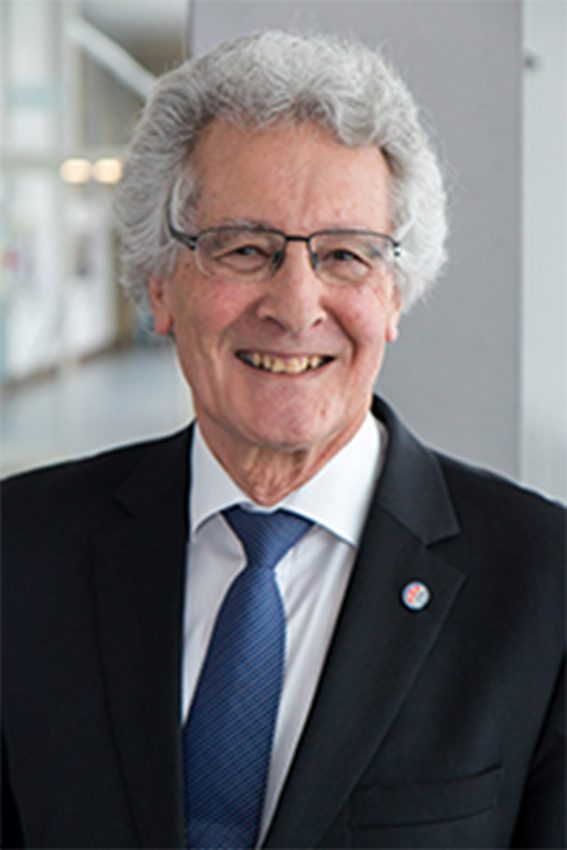Good practice for excellent and credible research Professor Litterst steps down as chairman after 12 years

Professor Jochen Litterst chaired the Commission for Assuring Good Scientific Practice for 12 years. Image credits: Sebastian Olschewski/TU Braunschweig
Before starting scientific work at the TU Braunschweig, researchers commit themselves to work according to the rules of science, lege artis. At the TU Braunschweig, the rules are laid down in the order “Principles for Ensuring Good Scientific Practice“. The safeguarding of these principles has been taken over by a senate commission at the TU Braunschweig. The previous chairman of the commission, former president and physicist Professor Jochen Litterst, has now resigned as chairman after 12 years and reports on his past work.
“Fortunately, the number of tips and inquiries about scientific misconduct are very manageable at the TU Braunschweig. The commission received an average of about four to five tips per year, which then resulted in about one or two cases to be investigated in more detail, according to Professor Litterst, who chaired the commission from the winter semester 2009/2010 onward. “Each case is an individual case and must be considered individually.” Careful work is required, with many hours going into reviewing and evaluating documents before proceedings are opened.
Intellectual property violations
It is not the plagiarism cases of dissertations with insufficient citation or copyright violations that determine the work of the commission. This is certainly related to the introduction of a mandatory review of electronic versions of theses. More typical cases of scientific misconduct involve “embellishing” when submitting proposals and in publications, which includes “cooking”, i.e. concealing negative results and presenting only desired results, and “trimming”, the deliberate manipulation of measured values. Often, intellectual property infringement through non-consensual use of data or ideas and non-consideration of authorship play a role.
A diverse range of people turn to the commission. “From colleagues, to current and former employees, external private individuals, but also external colleagues, sometimes from abroad, to anonymous whistleblowers have sought contact with us,” says Professor Litterst. The specific cases of suspicion are then initially passed on to the representatives in the commission closest to the subject, in order to take into account the different specialist cultures. However, external experts can also be consulted in the multi-stage confidential procedures.
Consultation comes first
Indications of possible scientific misconduct and requests for advice can be addressed to the two ombudspersons or the chairperson of the investigative commission. These consultations are also strictly confidential. “Most of the inquiries are about substantive questions regarding good scientific practice. As a rule, whistleblowers are advised in detail without any preliminary proceedings being initiated,” reports Professor Litterst.
Proactive clarification
To prevent scientific misconduct from occurring in the first place, proactive measures such as further education and training, especially for junior staff, should be the first priority, Litterst demands. For example, the commission members go into the research training groups and educate them about the rules of science. Since the interpretation of what “lege artis” means differs by discipline, the commission is staffed with members of various disciplines.
“A guarantee of compliance with the rules is important, for example, in order to be able to submit successful applications for third-party funding to the German Research Foundation, DFG,” emphasizes Litterst. The DFG’s code “Guidelines for Ensuring Good Scientific Practice” also provides the framework for the regulations at the TU Braunschweig. The goal is to anchor a culture of scientific integrity in the German scientific landscape. The amendment to the regulations passed by the Senate in March 2021 already takes into account the DFG guidelines that are essential for this area of responsibility. The Commission’s experience from the years since the last amendment (2013) has been incorporated.
Quality assurance
What could be improved in the future? “Making it easier to contact the commission via the TU homepage would be desirable,” says Professor Litterst. “It should be clear that contact can also be made anonymously and via the contact person from the academic mid-level staff (already provided for in the amended regulations). Especially contacting and exchanging information with anonymous whistleblowers is difficult and could be simplified via a dedicated portal of the commission. “Quality assurance must begin early on in the course of studies, since students are already gradually involved in scientific work. Early awareness of good scientific practice is an important factor in avoiding scientific misconduct,” says Litterst. “And for each discipline, an easy-to-understand handout with explanations would be very helpful so that the “leges artium” can be implemented and lived even better by scientists.”
“For society’s trust in science, honesty is the most important basis. It is one of the essential principles of all scientific work,” said TU President Professor Angela Ittel. “For carrying out this very important task of quality assurance, I sincerely thank the outgoing members of the Commission ‘To Ensure Good Scientific Practice’. On behalf of the entire TU Braunschweig, I would especially like to thank Professor Jochen Litterst, who chaired the commission for 12 years with extraordinary commitment and a great deal of tact.”
Role model
The work of the outgoing commission is not quite finished yet. Only when all cases that have been reported during the commission’s term of office have been dealt with will the commission’s work also come to an end. Professor Litterst has already drawn a conclusion: “Guidelines for good scientific practice may be helpful and necessary, but the most important thing is one’s own practice, which is acquired through joint scientific work with experienced scientists who set a good example.”
